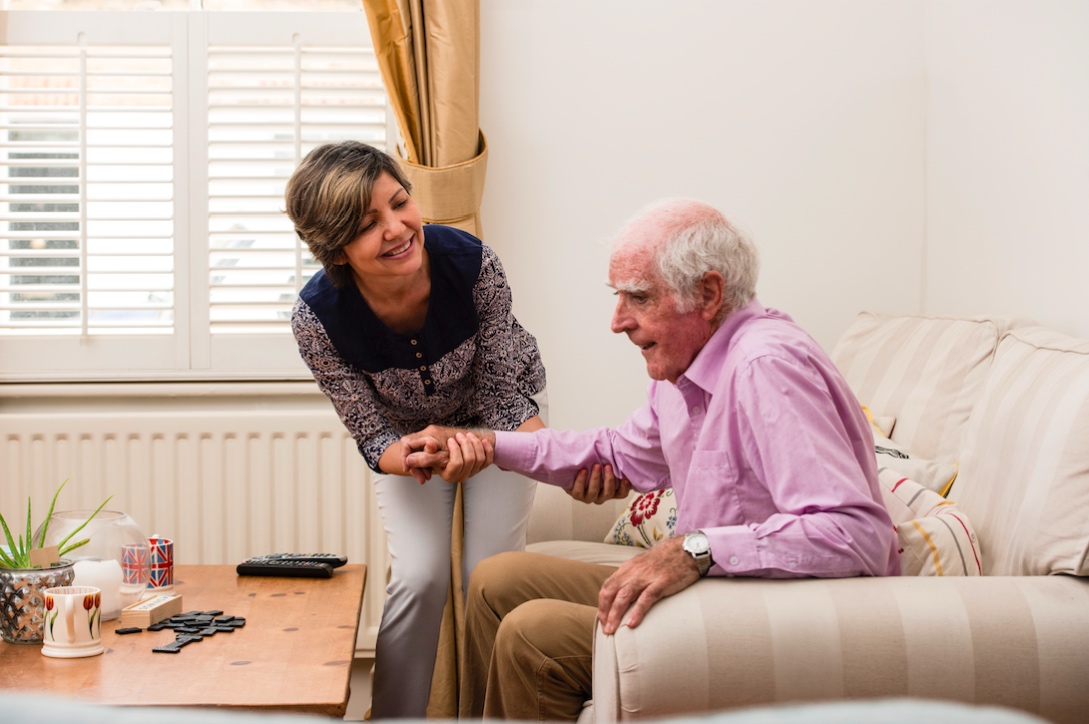Alzheimer’s disease affects more than memory and thinking. The brain controls every movement and process in the body, so as brain cells become damaged, physical changes follow. Your loved one’s movement, appetite, and coordination can all be affected.
Understanding these physical changes helps you recognise symptoms early and provide appropriate care.
Key Insights:
- Alzheimer’s damages brain cells that control movement, balance, and coordination – physical changes often appear before severe memory loss.
- Falls are a major risk as the disease progresses, with spatial awareness and balance deteriorating even in early stages.
- Weight loss is common in advanced Alzheimer’s as people forget to eat, lose interest in food, or develop swallowing difficulties.
- Urinary tract infections occur more frequently in people living with dementia and can cause sudden increases in confusion or behavioural changes.
How Alzheimer’s affects the body
Alzheimer’s gradually damages brain cells that send signals to muscles and organs. This affects coordination, balance, appetite, digestion, and the ability to swallow or speak clearly.
Physical changes can appear early in the disease progression. Recognising these changes helps you prepare and maintain your loved one’s comfort and dignity.
“Alzheimer’s gradually affects coordination and spatial awareness, increasing fall risk as the condition advances. Our carers are trained to spot these subtle changes early, adjusting support to maintain mobility and independence safely at home.”
– Adebola Adeyemi, Clinical Manager (Nurse) at Hometouch
Impaired movement
Changes in walking or posture can be early physical signs of Alzheimer’s. Brain damage slows or interrupts the signals that control muscle movement.
Your loved one might take shorter steps, drift to one side, or walk more slowly. Over time, they may shuffle, drag their feet, or need help standing and walking safely.
Tip: Regular gentle activity, like supported walking or physiotherapy, helps maintain strength and reduce stiffness.
Balance and coordination problems
Alzheimer’s affects spatial awareness and coordination, making it harder to judge distances or stay steady. Your loved one may bump into furniture or struggle with stairs and uneven surfaces.
Balance changes increase the risk of trips and falls. Well-lit rooms, clear walkways, and supportive footwear or walking aids improve safety.
Muscle stiffness and shaking
Muscle stiffness can occur in Alzheimer’s, although it’s more commonly associated with Parkinson’s disease. Muscles may become rigid or tremble slightly, making movement difficult.
In later stages, muscles may tighten and waste away, making sitting or lying uncomfortable for extended periods. Carers need to reposition regularly to prevent pressure sores and maintain comfort.
Weight and appetite changes
As cognitive and coordination abilities decline, eating becomes more difficult. Your loved one might forget to eat, lose interest in food, or struggle with chewing and swallowing.
Weight loss is common in advanced stages. Soft meals, smaller portions, and mealtime supervision help maintain nutrition and prevent dehydration. If swallowing difficulties develop, a speech and language therapist can provide tailored guidance.
Toilet and bladder issues
Reduced mobility, low fluid intake, or poor diet can lead to constipation. Over time, bowel control may be lost. Regular fluids, fibre-rich foods, and gentle movement support digestive health.
Urinary tract infections (UTIs) occur more frequently in people living with dementia. They can cause increased confusion, abdominal pain, or incontinence. Early treatment prevents complications.
In advanced Alzheimer’s, the brain may lose control of bladder and bowel function entirely.
Swallowing and breathing difficulties
In late-stage Alzheimer’s, the brain can lose control of muscles needed for swallowing and breathing. Your loved one might cough or choke when eating, as food or drink enters the airway.
This can lead to aspiration pneumonia – an infection that develops when food or liquid enters the lungs. Thickened fluids, pureed foods, and guidance from speech therapists or dietitians reduce these risks.
Caring for physical changes
Alzheimer’s progressively affects both mind and body. These physical changes can be distressing to witness, but awareness and planning help maintain safety and comfort for your loved one.
If you’re noticing physical changes in your loved one, our clinical team can help. Hometouch’s specialist carers provide tailored support at home, keeping your loved one safe and comfortable in familiar surroundings.





